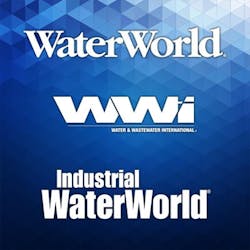Massachusetts Clean Energy Center Awards University of Massachusetts Amherst and Aqua Metrology Systems a Grant to Develop an Online Raw-Water THM-Precursor Analyzer
AMHERST, MA, JAN 23, 2018 -- Aqua Metrology Systems (AMS) and University of Massachusetts Amherst (UMass Amherst), partnering to develop a robust online raw-water trihalomethanes (THMs) -precursor analyzer, announced on 23 January 2018 they have received a commitment from Massachusetts Clean Energy Center (MassCEC) through its AmplifyMass program to cost share in the development and assessment of this new online THM-Precursor analyzer.
The high frequency of reliable and accurate data provided by this novel instrument will enable water utilities to adjust their treatment processes accordingly to minimize the production of these harmful carcinogens; and for some, even reduce the costs of producing water that satisfies THM regulations. Real time drinking water quality data is essential to human health, especially in the control of regulated carcinogenic THMs that result from the disinfection of raw or treated water by chlorine. A reliable and rapid method for predicting the potential formation of THMs from raw, not yet chlorinated, water has not existed, a pressing need this technology works to address.
“We are pleased to support UMass Amherst and Aqua Metrology Systems in their effort to streamline the drinking water treatment process while saving money and resources for water treatment plants,” said MassCEC CEO Stephen Pike. “In addition to aiding the production of safe drinking water, this will also have significant benefits for AMS’ manufacturing partner, Dakota Systems, based in Lowell, and UMass Amherst’s national leadership in drinking water research, water analysis and treatment.”
AMS and UMass Amherst have undertaken a long-term study of a prototype online THM-FP instrument that combines sample chlorination with thermally-accelerated formation of THMs, and subsequent rapid THM determination. Results from this THM precursor analyzer are being compared to precursor concentrations, characteristics, and levels determined by conventional laboratory methods that take an average of three to five days to return data on resulting THM levels. Additionally, results are being compared with the online determination of other water quality parameters, such as measurements of total organic carbon (TOC) and spectral analyses.
THM formation is dependent on water quality, treatment operations and network activity. As such, the quantity and quality of THM precursors in water sources will affect disinfection by-product (DBP) levels. David Reckhow, Professor of Civil and Environmental Engineering at UMass Amherst believes that developing a better understanding of DBPs and their precursors is a major thrust of drinking water research. “Naturally-occurring trace organic constituents in water react with chlorine to produce a wide array of carcinogenic DBPs, including the THMs. There are approximately 700 known DBPs and this work will help us to advise on methods for monitoring precursors to THMs and other DBPs, both regulated and emerging.”
Through this work, which has already generated considerable interest from both large and small water systems, AMS and UMass Amherst will be providing water systems with the capability to minimize the production of carcinogenic THMs to the benefit of their consumers.
The high frequency of reliable and accurate data provided by this novel instrument will enable water utilities to adjust their treatment processes accordingly to minimize the production of these harmful carcinogens; and for some, even reduce the costs of producing water that satisfies THM regulations. Real time drinking water quality data is essential to human health, especially in the control of regulated carcinogenic THMs that result from the disinfection of raw or treated water by chlorine. A reliable and rapid method for predicting the potential formation of THMs from raw, not yet chlorinated, water has not existed, a pressing need this technology works to address.
“We are pleased to support UMass Amherst and Aqua Metrology Systems in their effort to streamline the drinking water treatment process while saving money and resources for water treatment plants,” said MassCEC CEO Stephen Pike. “In addition to aiding the production of safe drinking water, this will also have significant benefits for AMS’ manufacturing partner, Dakota Systems, based in Lowell, and UMass Amherst’s national leadership in drinking water research, water analysis and treatment.”
AMS and UMass Amherst have undertaken a long-term study of a prototype online THM-FP instrument that combines sample chlorination with thermally-accelerated formation of THMs, and subsequent rapid THM determination. Results from this THM precursor analyzer are being compared to precursor concentrations, characteristics, and levels determined by conventional laboratory methods that take an average of three to five days to return data on resulting THM levels. Additionally, results are being compared with the online determination of other water quality parameters, such as measurements of total organic carbon (TOC) and spectral analyses.
THM formation is dependent on water quality, treatment operations and network activity. As such, the quantity and quality of THM precursors in water sources will affect disinfection by-product (DBP) levels. David Reckhow, Professor of Civil and Environmental Engineering at UMass Amherst believes that developing a better understanding of DBPs and their precursors is a major thrust of drinking water research. “Naturally-occurring trace organic constituents in water react with chlorine to produce a wide array of carcinogenic DBPs, including the THMs. There are approximately 700 known DBPs and this work will help us to advise on methods for monitoring precursors to THMs and other DBPs, both regulated and emerging.”
Through this work, which has already generated considerable interest from both large and small water systems, AMS and UMass Amherst will be providing water systems with the capability to minimize the production of carcinogenic THMs to the benefit of their consumers.
